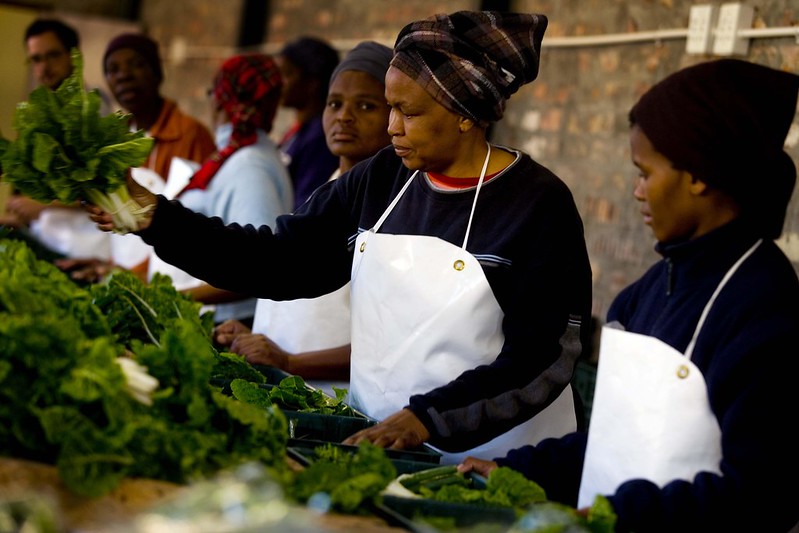COVID-19 Brings Positive Change to South Africa
 When COVID-19 came to the world stage in early 2020, many scientists worried about Africa’s response to the novel coronavirus. They were worried that African countries would not have the resources to combat the global pandemic. Given the continent’s past struggles to contain diseases such as tuberculosis, HIV/AIDS and Ebola, concerns that Africa would be an epicenter for COVID-19 were well within reason. Fortunately, a comprehensive response has quelled these concerns, and COVID-19 may actually bring positive change to South Africa.
When COVID-19 came to the world stage in early 2020, many scientists worried about Africa’s response to the novel coronavirus. They were worried that African countries would not have the resources to combat the global pandemic. Given the continent’s past struggles to contain diseases such as tuberculosis, HIV/AIDS and Ebola, concerns that Africa would be an epicenter for COVID-19 were well within reason. Fortunately, a comprehensive response has quelled these concerns, and COVID-19 may actually bring positive change to South Africa.
Swift Response
South Africa’s President Cyril Ramaphosa, however, showed the world that not all African countries fit the stereotypes of squalor and poverty that many believed. His response to COVID-19 in South Africa has received praise and influenced the responses of nearby leaders. It seemed like he learned from his predecessors, and his swift and strict lockdown of the country prevented COVID-19 in South Africa from getting out of control. Even though COVID-19 shut down the country, responses to the disease have had a net positive effect on South Africa, initiating safety nets, public health initiatives and economic reforms. Here are 6 ways that COVID-19 has influenced positive change in South Africa and forced to country to look to the future.
How COVID-19 has Positively Changed South Africa
- Less Gang Violence: Gang violence has plagued South Africa for years, and Cape Town has seen some of the worst of it. In 2018, it was one of the most violent cities in the world, with 66 homicides per 100,000 people. But when COVID-19 hit South Africa in March 2020, gangs called for a national ceasefire and homicides fell more than 70%. South Africa’s lockdown also interrupted the drug supply chains, and many gang-afflicted communities in South Africa are feeling the reprieve.
- Fewer Alcohol-Related Deaths: South Africans have the highest rate of drinking out of any African country. This has lead to the country’s high rate of alcohol-related deaths. Part of the COVID-19 lockdown in South Africa was also a ban on alcohol. Since the law passed, the country has seen fewer drinking-related deaths. One hospital’s trauma cases dropped by two-thirds after the ban took effect. The country saw a stunning 81% decrease in road fatalities over Easter weekend in 2020 compared to 2019. The alcohol ban hasn’t just decreased death rates, but it has also opened the country’s eyes to the drastic alcohol problem it faces.
- Better Welfare Services: The economic ramifications that came with shutting the country down led South Africa’s government to provide a $26 billion welfare and business support package. This was no small stimulus package. It was equivalent to about 10% of the nation’s GDP, and the plan is only predicted to grow as the pandemic continues. Businesses weren’t the only ones getting bailed out. Additional funds were set aside for child caregivers, and 6 million people were able to collect monthly unemployment benefits.
- Stronger Calls for Public Hygiene: COVID-19 in South Africa has also brought to light the need for stronger public health initiatives. The lockdown exposed the discrepancy between the number of people thought to have access to clean water and the number of people who can actually obtain it. A worldwide consensus that a strong healthcare system and robust public hygiene are essential to fighting coronavirus has developed. The consensus has put pressure on South Africa’s leadership to expand public health initiatives.
- Economic Reform: South Africa is still transitioning its economy from the legacy of apartheid. However, COVID-19 affected low-income families who work in manufacturing, tourism, service and transport more than any other group in the country. The economic devastation has been felt unequally across the country, further reinforcing the need for a new economic plan. A specific investigating unit has already been given permission to look into corruption. Further, Public Enterprises Minister Pravin Gordhan has planned widespread, structural reforms for state-owned enterprises. Essentially, South Africa missed its opportunity to transform its economy immediately after apartheid, but COVID-19 in South Africa has paved way for “New Deal” style economic reforms.
- Learning from the Past: The difference in South Africa’s response to COVID-19 when compared to its response to HIV (or really, the lack thereof) is a clear indicator that South Africa has learned from their past mistakes in crisis response. While South Africa is one of the most afflicted countries to date in Africa, healthcare professionals and activists in South Africa have commended the country’s quick response. As of early June, the country had conducted 635,000 COVID-19 tests, which was greater than many countries around the world. The country has even deployed thousands of health care workers to go door-to-door to do testing and screening.
While the pandemic in South Africa is not over by any means, it seems that the disease will not leave the country unchanged. Instead, COVID-19 has initiated positive change in South Africa and will leave in its wake a safer, more equitable society. South Africa will not only be more equipped to deal with diseases in the future, but will also treat its citizens fairly even absent a global pandemic.
– Hannah Daniel
Photo: Flickr
